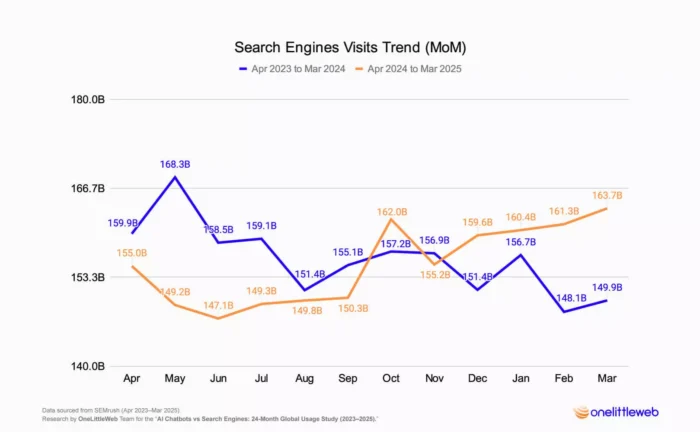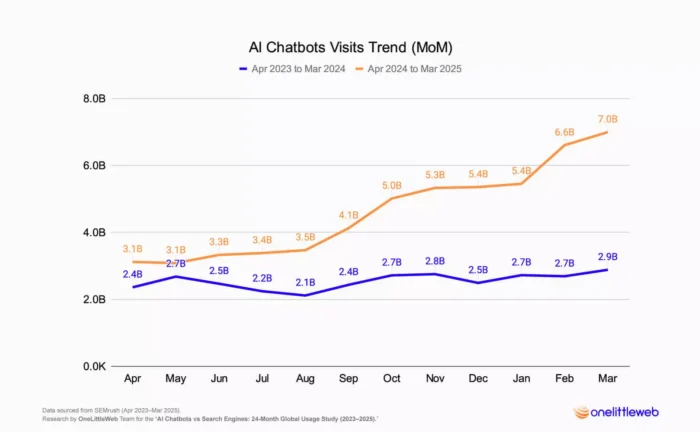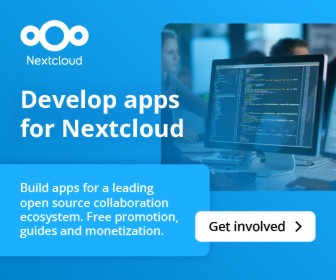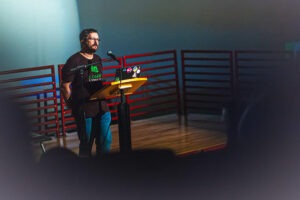AI is changing how we find information, but is the web keeping up?

Here at FOSS Force, we’ve set our browsers to default to the traditional search engine DuckDuckGo when we type a search query into the address bar—originally designed for URLs only until it started being used to pull double duty. For queries through the search bar—the traditional place for typing searches, which has disappeared in most modern browsers—we default to the search-oriented chatbot Perplexity. This makes it crazy simple for us to choose which to query on the fly. If you’re also mixing AI-assisted search with traditional search, you’re riding a rising trend.
According to a recent study from the SEO marketing agency OneLittleWeb that looked at traffic trends over the last 24 months, the use of chatbots and traditional search are both growing.
Perhaps normal for an upcoming technology, the AI bots are seeing the most explosive growth, with the 10 most popular chatbots seeing traffic jump from 2.4 billion visits in April 2023 to 7.0 billion visits in March 2025, a 191.67% increase. The growth for the top 10 search engines was more modest, going from 159.9 billion visits in April 2023 to 163.7 billion visits in March 2025, for a 2.38% increase.
Bot Searches and the End of SEO
OneLittleWeb’s co-founder Sujan Sarker doesn’t think this means that traditional search is necessarily on its way out. She points out that not only do the traditional search sites continue to dominate, but that trad search saw a significant uptick in traffic after sites such as Google and Bing began incorporating AI features into their search results.
“AI chatbots are not replacing traditional search engines but reshaping how we interact with information,” she said. “Despite a slight decline in search engine visits, platforms like Google and Bing are bouncing back, integrating AI features such as Search Generative Experience and AI Overviews.”
Search Generative Experience–or SGE–is Google’s jargon for describing its generative AI-powered experimental upgrade to its search engine.
You would do well to understand that Sarkar’s viewpoint is not impartial. Considering that chatbots are famous for their “zero-click” searches, meaning they generate little traffic to websites, SEO would become practically meaningless with traditional search removed from the picture.
Will Search Engine’s Dominance Continue?
In a way, AI is rewriting the definition of the term “web search.” A user of an AI search bot isn’t seeking links to articles containing the facts they’re seeking, but is expecting the bot to search the web, find the article, and bring the fact back to the user, all wrapped in a nice little package.

This isn’t good for the vast majority of website operators who are publishing content instead of selling products. The user of an AI search bot has no need to invest time reading an article–where they might learn more than the single query they’re seeking to answer.
Sarkar indicates she doesn’t think that’s going to happen–but much of that might be wishful thinking.
“As AI chatbots continue to thrive, search engines remain the dominant tool for comprehensive information, creating a dynamic and complementary relationship between both,” she said. “For SEO professionals and content creators, adapting to this hybrid approach will ensure relevance in the future of AI-powered search.”
Me? I’m betting that Google search will continue to be the dominant search site, but that it’ll manage to hold that position only by increasingly turning search over to its Gemini AI platform. Going forward, fewer and fewer searches will result in the searcher clicking a link to go to a website, but will have their search queries directly answered by the search bot instead.
Of course, eventually the search bots won’t always be able to answer many of the search queries they’re given, because there won’t be many websites putting up content anymore, which will remove the source of AI’s knowledge.
Christine Hall has been a journalist since 1971. In 2001, she began writing a weekly consumer computer column and started covering Linux and FOSS in 2002 after making the switch to GNU/Linux. Follow her on Twitter: @BrideOfLinux




